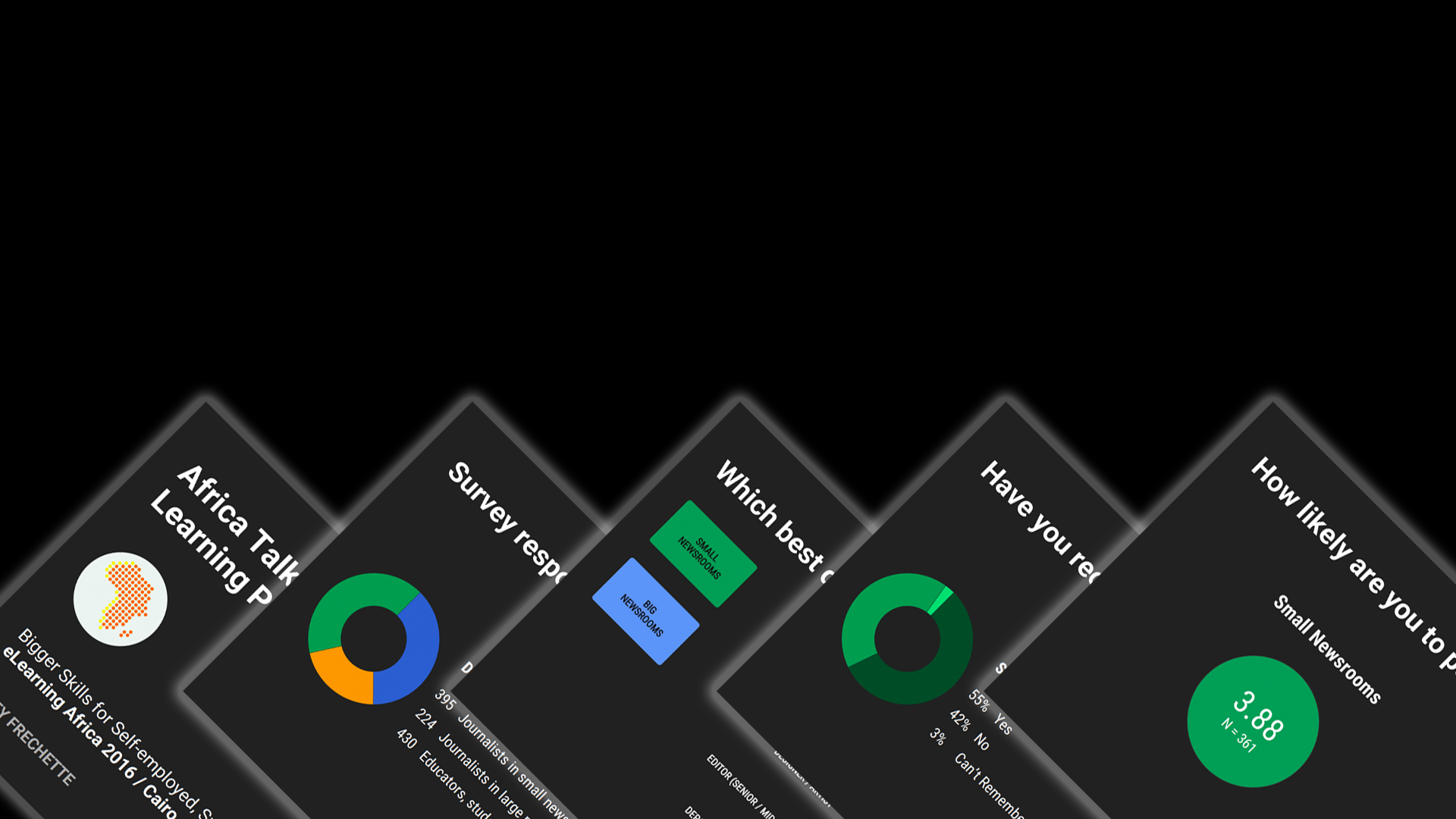African Journalists See Great Value in Training, Especially When It’s Delivered Online

African Journalists See Great Value in Training, Especially When It’s Delivered Online
African journalists want more training, and they want to receive it online. That’s the key takeaway from our survey of nearly 1,100 journalists working across the continent.
On May 25, we’ll begin sharing detailed results from our study at eLearning Africa 2016, an annual education and technology conference. We’ll focus on responses from small newsrooms at the conference in Cairo, and we’ll highlight ways to deliver blended training — instruction with both online and in-person components.
The findings we’ll present will inform the custom e-learning platform we’re building. We continue to seek input from journalists in Africa as we move toward our goal to create both technology and content designed with an African audience in mind.
THE CASE FOR TRAINING
Journalists find themselves in a precarious position. They work in a fast-changing industry built on a diverse and growing skill set. To do their jobs effectively, journalists need to learn continuously. But, they have little time or funding for training.
African journalists face these same challenges, and then some: restrictive press laws, intimidation from government officials, outdated equipment and inadequate resources.
This creates a great need for professional training but also great barriers to access.
THE TRAINING AFRICAN JOURNALISTS WANT
We conducted a needs assessment to figure out the best ways to approach training for journalists in Africa given the unique circumstances in which they work. Overall, 395 of the journalists who participated in our survey work in newsrooms with fewer than 50 employees. This is the group we’ll focus on at eLearning Africa 2016. Most of these journalists — 56 percent — are reporters. Senior and mid-level editors comprise 20 percent of the respondents, and copy editors and online producers account for another 13 percent.
The largest number of respondents — 41 percent — has worked professionally for less than five years. The next largest number — 28 percent — has worked professionally between five and nine years.
Journalists in small newsrooms see their personal training needs and those of their organizations in similar terms. Most respondents see their newsroom’s biggest training needs as follows:
- Investigative Reporting
- Engaging Audiences with Social Media
- Audience Development / Engagement
- Blogging / Web Writing
- Multimedia Storytelling
For themselves, the list of the top-five most-requested topics is the same, though more respondents want blogging and web writing help.
What about the training African journalists in small newsrooms already receive? 55 percent of journalists in small newsrooms have taken part in some kind of training in the last year. The five most popular topics are:
- Investigative Reporting
- Engaging Audiences with Social Media
- Blogging / Web Writing
- Writing Skills (Clarity, Concision)
- Reporting Skills (Developing Sources, e.g.)
There’s a lot of overlap between the training African journalists want and what they’re getting. But it also appears that they would like to see less attention on the core skills of writing and reporting and more on emerging competencies such as audience development and multimedia storytelling.
Meanwhile, African journalists see investigative journalism as the quintessential training topic. It’s both the topic they receive the most training in and the one they most want more of.
THE TRAINING AFRICAN JOURNALISTS ARE GETTING
Journalists in Africa have mixed satisfaction levels with the training they’re getting, though most experiences are positive. For small newsrooms, 59 percent of journalists view the training they’ve received positively, 19 percent view it negatively and 22 percent are neutral.
When it comes to improving the training they’re getting, journalists across all newsrooms share similar concerns. First, they want more training than they’re getting. Sessions are too brief, and they’re too infrequent.
Those who feel less satisfied with what they’re getting cite common concerns. Some trainers spend too much time focused on theory, neglecting tangible skills. Some sessions rely too heavily on lecture, without enough hands-on practice. Content, too, is lacking at times. Respondents felt some sessions were too basic, didn’t incorporate enough African examples and relied on out-of-date tools, technologies and methods.
THE POTENTIAL FOR BLENDED AND ONLINE TRAINING
Almost all — 92 percent — of the journalists in the small newsrooms we surveyed want more training. 77 percent think online training will help them significantly, and another 14 believe it will help somewhat. The numbers are similar for those in large newsrooms, along with freelancers, educators and students.
African journalists want more training, and they’re open to receiving it online and in blended formats. So why aren’t they getting it already?
The vast majority of respondents cited financial constraints as the biggest barrier. Lack of time and an inability to find the training needed are other concerns.
These factors make the flexibility and cost effectiveness of online and hybrid models attractive. But important questions remain about how we can make online and blended training truly effective — and not just efficient — for African journalists.
Online delivery has pros and cons. It’s easier to tailor digital resources to individual learner needs, and it’s often faster and more convenient to access online resources. But the dedicated time and space required of in-person training can facilitate understanding and foster accountability. Many learners and trainers alike continue to value the collaboration possible only with in-person experiences.
Blended solutions that combine both learning formats present one way to capitalize on each format’s strengths. A kickoff in-person session might branch into follow up online. The most popular material can be delivered across multiple platforms, whereas a deeper training library can be made available strictly online. Participant experiences and insights collected in one platform can inform the training delivered in another.
These are a few of the possibilities we look forward to discussing further in Cairo and as we develop our project.










